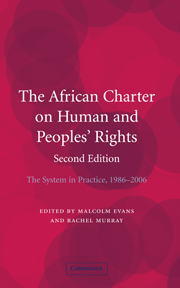Book contents
- Frontmatter
- Contents
- List of contributors
- Table of cases
- List of abbreviations
- Editors' Preface
- Introductory Preface: The African Charter and African Commission on Human and Peoples' Rights
- 1 The African Union and the Regional Human Rights System
- 2 The State Reporting Mechanism of the African Charter
- 3 Communications under the African Charter: Procedure and Admissibility
- 4 Evidence and Fact-Finding by the African Commission
- 5 Civil and Political Rights in the African Charter on Human and Peoples' Rights: Articles 1–7
- 6 Civil and Political Rights in the African Charter: Articles 8–14
- 7 Group Rights
- 8 The Role of Non-governmental Organisations and National Human Rights Institutions at the African Commission
- 9 A View from the Inside: The Role of the Secretariat
- 10 The Special Rapporteurs in the African System
- 11 Working Groups of the African Commission and their Role in the Development of the African Charter on Human and Peoples' Rights
- 12 The Creation of a New African Court of Justice and Human Rights
- 13 Protocol to the African Charter on the Rights of Women in Africa
- Bibliography
- Index
13 - Protocol to the African Charter on the Rights of Women in Africa
Published online by Cambridge University Press: 01 July 2009
- Frontmatter
- Contents
- List of contributors
- Table of cases
- List of abbreviations
- Editors' Preface
- Introductory Preface: The African Charter and African Commission on Human and Peoples' Rights
- 1 The African Union and the Regional Human Rights System
- 2 The State Reporting Mechanism of the African Charter
- 3 Communications under the African Charter: Procedure and Admissibility
- 4 Evidence and Fact-Finding by the African Commission
- 5 Civil and Political Rights in the African Charter on Human and Peoples' Rights: Articles 1–7
- 6 Civil and Political Rights in the African Charter: Articles 8–14
- 7 Group Rights
- 8 The Role of Non-governmental Organisations and National Human Rights Institutions at the African Commission
- 9 A View from the Inside: The Role of the Secretariat
- 10 The Special Rapporteurs in the African System
- 11 Working Groups of the African Commission and their Role in the Development of the African Charter on Human and Peoples' Rights
- 12 The Creation of a New African Court of Justice and Human Rights
- 13 Protocol to the African Charter on the Rights of Women in Africa
- Bibliography
- Index
Summary
Introduction
In line with global developments, the issue of women's rights has grown both in focus and importance on the African continent. This chapter focuses on the adoption by Member States of the African Union of the Protocol to the African Charter on Human and Peoples' Rights on the Rights of Women in Maputo in July 2003 (hereinafter ‘the African Women's Protocol’ or ‘the Protocol’). The Protocol came into force on 25 November 2005.
Locating women's rights within the continental human rights framework
Although feminist scholars have, in the past, argued that international law is sexist, ignoring or minimising the violations of rights experienced by women, especially in the private sphere, this is not an accusation that can, at first glance, be levelled at the African human rights system. The founding human rights instrument on the continent, the African Charter on Human and Peoples' Rights proscribes discrimination on grounds of sex, and guarantees equal protection of the law for all. Recognising the particular disadvantages faced by women within the family, it returns to women's rights in Article 18, noting: ‘The state shall ensure the elimination of every discrimination against women and also ensure the protection of the rights of the woman and the child as stipulated in international declarations and conventions.’
Commentators have noted that, together with Articles 60 and 61 of the Charter, this provision enjoins States Parties to take into consideration existing human rights norms and jurisprudence.
- Type
- Chapter
- Information
- The African Charter on Human and Peoples' RightsThe System in Practice 1986–2006, pp. 441 - 474Publisher: Cambridge University PressPrint publication year: 2008



